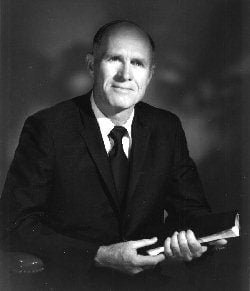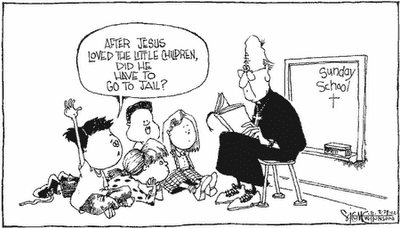
I first published this post by my dear friend Cat Givens years ago. Edited for spelling, grammar, and readability.
When I was growing up in northeast Ohio, my family attended a Baptist church. It was one of those places where you’d meet every Sunday morning and then again Sunday evening. Bible study on Wednesday night. Soul-winning every Tuesday evening. Thursdays were youth group nights, and on Friday or Saturday we may have some other activity and then back again on Sunday.
We learned about heaven and hell. They preached a lot about hell.
I can remember being taught as a young child to tell everybody I came in contact with about Jesus and how to be saved. If I neglected to tell someone, then on Judgment Day this would happen: the person I did not tell would be led before the Lord God. I would be sitting behind God with the rest of the saved people. God would turn the person I neglected away, saying he did not know them. As they were led away, they would see me behind God and scream, “WHY? Oh, WHY didn’t you tell me?” And as they were led away to be cast into eternal fire, damned for all eternity, their blood would be dripping from my hands. Pretty heavy stuff for a kid, huh?
I was a bit of a rebel in my teens, and I’d run away when I got the chance rather than face the consequences at home for my actions. Finally, when I was almost fifteen, my parents were at their wit’s end. I was in the Detention Home for running away yet again, and they sought out help from the “experts”. A nice lady at the United Way told my parents that doctors were having success with rebellious children by hospitalizing them and giving them intense psychotherapy.
My parents met with the doctors, then the doctors met with me. “Yes, they could help me,” they assured my folks. They told Mom and Dad I could be transformed into a willing obedient child and would change my “criminalistic way of thinking”.
I was sent to a local hospital’s psych ward, housed with mostly adults (this was 1974, and there were no children’s wards at that time here). I was locked up with a bunch of strangers. I was shot full of “behavior modifying” drugs which made my physical movement robotic. I also received electroshock therapy treatments. Thanks a lot, Dr. Vallaba! Some of the men abused me while I was in there. I thought I fell in love with a man who said he and Bob Dylan shared a soul.
After the doctors had used up all my parents’ insurance money, they wanted to send me to another hospital in Connecticut. However, Mom and Dad had been talking to the preachers. They had another idea. Off to a girl’s home in Louisiana for me: New Bethany Home for Wayward Girls. I would remain there for a year.
Surely, this would save my soul and make me a compliant teenager, my parents and preachers thought. Unfortunately, at New Bethany, the same type of hellfire and brimstone attitude prevailed. I was not allowed to wear pants, as that was considered a sin. I couldn’t listen to any music besides Southern Gospel, as that was also a sin. I couldn’t talk about my past, as I had no past. I had to be called by my first and middle name because I was to become a new person.
There was an Evangelical preacher who ran the place, Rev. Mack Ford — an acolyte of Lester Roloff. He and his wife, Thelma, founded the home, taking in rebellious teens from all over the country. They also took in the unwanted girls whose parents abandoned them there. We were required to comply with every rule. Not doing so resulted in us getting whipped with a belt. That was the easy punishment. If a girl acted out, often she would be forced, after lights out, to stand in the hallway on her tiptoes with eggs or tomatoes under her heels. If she slipped and squished one, she’d get a whipping with a belt or hit with the switch. Runaways from the home were usually caught, and then, after a sound whipping with a belt from Bro. Mack would be handcuffed to their beds, and a ‘trusted girl” would be given the key. Their meals were served at their beds. These rebellious girls were only uncuffed for bathroom and shower breaks. Once Bro. Mack determined they had sufficiently repented, the cuffs were removed.
Everything we did was strictly controlled. We were told not to trust our conscience, as the Devil could be in there, so only trust the Bible. And trust Bro Mack.
Every day after chores, we would have chapel. There we would learn about hell, how the love of God brought us to this place, and how we must repent of our evil ways and change. Then we had breakfast. After more chores, off to school — a trailer down the street with one teacher and learning packets. It was an ACE school . . . Accelerated Christian Education. (Please see My Life in an ACE School.) After school, it was time for chapel again, and then lunch. Then chores and free time, and then chapel and supper. Even our bathroom breaks were timed, and we actually had to count the toilet paper sheets, begging for more through the bathroom door if we needed it. We were often awakened in the middle of the night. Sleep deprivation — what Brother Mack called “breaking down the will” — was the norm. I could go on and on, but I think the picture is clear. This was a brainwashing Independent Fundamentalist Baptist (IFB) cult, and we were the subjects.
After nearly a year, I got to come home. And yes, I was changed. I was a good little obedient Baptist teenager who addressed her parents and all adults as “sir” and “ma’am.”
At my new Christian high school, I was more conservative than most of the staff! We would only have chapel once a week at this school, unless it was “spiritual emphasis week.” During “emphasis” week, we would have chapel every day. Chapel was where we were told about how the devil tries to get every teen to be worldly and do evil. We were ripe for the danger of hellfire! We must be saved. We must repent if we do anything displeasing to god. I recall Mr. Russell, the gym teacher, leading us in prayer, asking God to kill us rather than let us live to set a bad example!
Throughout high school, I loosened up quite a bit. I still believed the dogma, but wasn’t quite so hung up on the rules. I began to read the Bible for myself. It didn’t read the same on my own as it did with a preacher interpreting it for me.
After graduation, I began to think more for myself. I sought out a therapist who helped me overcome the guilt and confusion. Gradually, I was losing the dogma and forming my own spirituality. I found god in nature and other human beings. I read about other religions and philosophies, realizing there are many paths to enlightenment. I enjoyed comparing the teachings of my youth to the myths and stories from other cultures and religions. I saw beauty and truth in many forms and rejected the hellfire and brimstone from my upbringing. Or so I thought.
I recently found a movie that was shown to us “wayward girls” at New Bethany. It was about the communist takeover of the United States. I really wanted to see this film again as an adult without expecting a great revelation and insight. The movie, along with another about hell, arrived the other day and I watched them. The acting was way over the top, and the subject matter was absurd. There on the screen, a little boy had a bamboo stick driven through his ears so he could no longer hear the gospel. Communists on horseback terrorized citizens, and the blood and guts spilled! Demons tormented people in hell, and worms ate at the burning flesh of the damned.
What happened next is what shocked me the most. As the choir sang “Just As I Am” and the preacher pleaded with the congregation to come to the altar and get right with God, I felt uneasy and a little sick. Fear and dread took hold, and then the panic! What if it was true? Would my children go to hell and be tormented for all eternity because I chose to raise them as free thinkers?
Mind you, this is NOT how I believe, yet here it was, all this dread and fear and worry. I felt horrible and confused. It was as if a great wave had pummeled me, and I was breathless! I contacted a woman raised similarly and found that she, too, suffered from this occasionally. First, we discussed brainwashing and conditioned response, and then I began to examine more carefully what had happened to me (and others).
It was twenty-plus years of dogmatic teachings that took my emotions and spilled them out in front of me like many dice. I realized that this memory’s emotional effect needed to be changed. I found discussing these reactions with my therapist to be helpful, as were his words of encouragement. I reminded myself that it was out of love for my children I chose to NOT subject them to this stifling negative dogma. And I’m glad of it, as I would never want them to feel the way I did right then!
What good is spirituality if it does not lift one up? I examined what I actually do believe, and did some reading from some positive authors. I watched the movies again with my husband, and we laughed and shook our heads. The effect was more benign but not gone away completely, so I shall work on these memories some more, bringing in more humor and love. Still, I am amazed this dogma has followed me for so many years.
Has anything like this ever happened to you?
Bruce Gerencser, 66, lives in rural Northwest Ohio with his wife of 45 years. He and his wife have six grown children and thirteen grandchildren. Bruce pastored Evangelical churches for twenty-five years in Ohio, Texas, and Michigan. Bruce left the ministry in 2005, and in 2008 he left Christianity. Bruce is now a humanist and an atheist.
Connect with me on social media:
Your comments are welcome and appreciated. All first-time comments are moderated. Please read the commenting rules before commenting.
You can email Bruce via the Contact Form.









